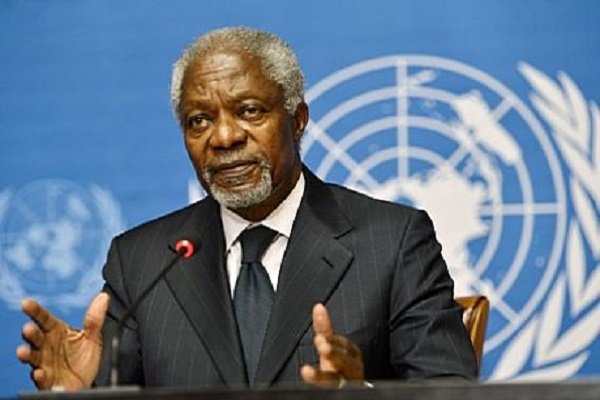Kofi Annan, former UN secretary general, dies

Kofi Annan, the former United Nations secretary general, has died at the age of 80 after a short illness, his family and foundation announced on Saturday.
The Ghanaian was the seventh secretary general of the UN between 1997 and 2006 and won the Nobel peace prize for his humanitarian work.
Born in Kumasi, Ghana, on 8 April 1938, he was the first secretary general to emerge from the ranks of United Nations staff.
He died in hospital in Bern, Switzerland with his wife, Nane, and three children Ama, Kojo and Nina, by his side.
Annan’s foundation issued a statement on his Twitter account on Saturday morning that described him as a “global statesman and deeply committed internationalist who fought throughout his life for a fairer and more peaceful world”.
The statement added that Annan, who succeeded Boutros Boutros-Ghali as UN leader, was a “son of Ghana and felt a special responsibility towards Africa”.
The current UN Secretary General, António Guterres, whom Annan had appointed to lead its refugee agency, said: “In many ways, Kofi Annan was the United Nations. He rose through the ranks to lead the organisation into the new millennium with matchless dignity and determination.”
Annan was chair of The Elders, an independent group of global leaders working for peace and human rights founded by Nelson Mandela. Gro Harlem Brundtland, former prime minister of Norway and the body’s deputy chair, said she and her colleagues were devastated by Annan’s death.
“Kofi was a strong and inspiring presence to us all, and The Elders would not be where it is today without his leadership. Throughout his life, Kofi worked unceasingly to improve the lives of millions of people around the world,” she said.
Born in Kumasi, Ghana, on 8 April 1938, Annan joined the UN system in 1962 as an administrative officer with the World Health Organization in Geneva. Annan later served with the Economic Commission for Africa in Addis Ababa, the UN Emergency Force in Ismailia, the UN high commissioner for refugees in Geneva and in several senior posts at its headquarters in New York.
Before becoming secretary general, he was under-secretary general for peacekeeping and also served as special representative of the secretary general to the former Yugoslavia between 1995 and 1996.
As head of UN peacekeeping operations, Annan was criticised for the body’s failure to halt the genocide in Rwanda in the 1990s.
“The UN can be improved, it is not perfect but if it didn’t exist you would have to create it,” he told the BBC during an interview for his 80th birthday in April. “I am a stubborn optimist, I was born an optimist and will remain an optimist.”
Annan used his final speech as secretary general in December 2006 to deliver a parting shot at the administration of George W. Bush, accusing the U.S. of committing human rights abuses in the name of fighting terror.
The Guardian concluded at the time that the speech amounted to a broad condemnation of the neoconservative ideology guiding U.S. foreign policy under Bush and was a clear break with protocol for a departing UN chief.
It was another sign of Annan’s anger at the administration since U.S. forces invaded Iraq in March 2003 without the approval of the UN security council.
“When power, especially military force, is used, the world will consider it legitimate only when convinced that it is being used for the right purpose – for broadly shared aims in accordance with broadly accepted norms,” he said in the speech delivered at the Harry Truman presidential library in Independence, Missouri.
(Source: The Guardian)

Leave a Comment